More on post-cyclone HB fruit situation
Heavy losses, income streams disrupted, sources of help.
Added 3 years ago
By Brenda Newth
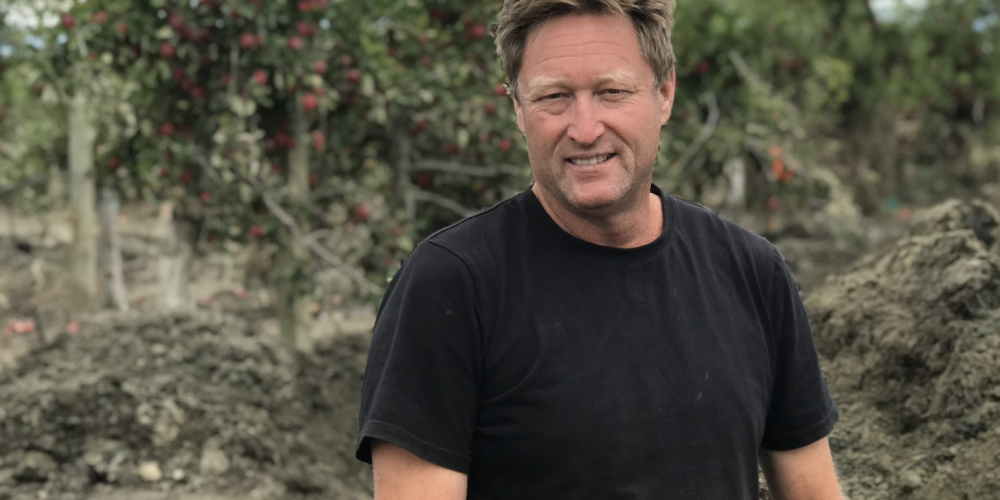
Brydon Nisbet, president Hawke’s Bay Fruitgrowers Association (HBFA) says that affected orchardists are salvaging what they can in the aftermath of Cyclone Gabrielle.
Speaking from one of his orchard blocks in Puketapu, within sight of a busted Tūtaekurī River stopbank, Nisbet estimates around 47% of Hawke’s Bay orchards have been affected to some degree by the cyclone.
“That’s around 4,000 hectares. Some have had water through, others have silt ranging from shallow to deep, and in some cases orchards have been completely flattened.”
*In addition to seasonal crop losses, a large number of orchards have sustained structural damage to land and improvements. In some cases it will take years before the productive capacity of properties can be fully restored. The uncertainty around how and whether these remediation efforts can be funded is creating extremely high levels of anxiety across the industry.
The short-term challenges are diverse including: dealing with waste streams (debris, rubbish and silt), the draining of waterlogged land, access to sites, technical support to assess the scale of damage, the preservation of capital infrastructure (including trees/vines) and complexities associated with harvesting and processing produce that remains viable. All these challenges are complicated by a lack of financial certainty which is holding back some decisions that are time-critical.
A horticultural advisory group (HAG), has been established to facilitate regional alignment across the different sectors. This currently includes representation from Hawke’s Bay Fruitgrowers, Hawke’s Bay Vegetable Growers, Hawke’s Bay Winegrowers, NZ Apples and Pears, Summerfruit NZ, NZ Kiwifruit Growers, and MPI. Additional representation is being sought from the arable and apiculture sectors. The chair of the HAG will also sit on the Rural Advisory Group (RAG) to ensure coordination across the wider primary sector.
Nisbet has 16 hectare of apple trees across three blocks. One is unaffected, one flood and silt affected but still standing, and one completely flattened. Because he is a grower of high value Rockit apples, it’s still viable to pick the tops of affected trees, observing strict protocols. Albeit at considerable additional expense and workaround.
He says he is working to save his trees, with silt up to 400mm deep on every square inch of his Puketapu block. “I won’t know fully until springtime when the blossoms come through whether its successful. It’s a waiting game,” he says.
In a blog posted on the fruitgrowers’ website, Nisbet says: “Harvest must go on and 70% of our industry are out there picking, packing, and getting their fruit ready for market which is hugely important for us and our region. I know we are all cheering you on to pick and pack the best fruit HB can offer to the world.”
Nisbet is working as part of a steering group of key players in the industry to pull a framework together to present to MPI and Government for additional cyclone support.
As well as clean up and advocacy, HBFA member wellbeing is front and centre.
“Our main objective is to take care of our growers,” says Nisbet. “Dean, our executive officer is ringing every single grower to check in and gauge where they’re at.”
A large proportion of growers live on their land, and many have lost their homes and their livelihoods. Most of the growers impacted also have obligations to employees which is adding an additional layer of complexity and anxiety.
Donations have been flooding (no pun) to the HBFA Charitable Trust Give a little page, Nisbet says. “It’s sitting at $21k, but there have also been a number of big donations straight into the HBFA bank account. So it’s probably around $40-$50k.”
All contributions will be used to address immediate wellbeing needs and to provide longer term pastoral care to assist in getting people back on their feet.
Hawke’s Bay Fruitgrowers has secured the services of psychologist Wanda Douglas (details of how to connect via HBFA website) to provide free and confidential psychological support to members and their families, with HBFA picking up the tab for the first three sessions.
Nisbet says that Wanda Douglas’ support had been arranged prior to the cyclone.
“Because it had been such tough couple of years. We were in drought prior to Covid, then it had been a really wet summer, and the grower pay-out situation. They were struggling.”
On advice for members, Nisbet says: “Keep talking to neighbours. Keep talking to different people. Don't do stuff on your own. The association is only a phone call away. Come to the events we put on. Stay connected.”
Cyclone Gabrielle impacts on fruit growing sector:
- 4000 hectares impacted
- 47% of crop affected – with level of damage ranging from workable, to completely submerged with deep silt, to destroyed
- There number of growers have been hit extremely hard, completely losing orchards and homes. Orchards in Dartmoor Valley, Esk Valley, Puketapu, Pakowhai, Twyford and Korokipo regions have experienced damage beyond belief.
- Government created a $25m fund to kick-start efforts to remove silt and support the clean-up. Equivalent to a pay out of up-to $2K/Ha to a maximum of $40K.
- Immediate cashflow concerns as growers have incurred most of their annual costs, and now lost the opportunity to recover these
- A horticultural advisory group has been established
- Industry framework being developed to present to Government for additional cyclone support.
*Article draws on HBFA report to HB Civil Defence on cyclone impact
Photo: HBFA President Brydon Nisbet at his Puketapu orchard.
Be the first to leave a comment.
Leave a comment
All comments are reviewed before they are published on the website. Your email address will not be published.
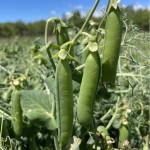
Carbon Positive Trial Update – February 2025
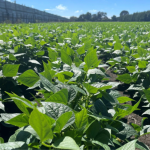
Carbon Positive Update

Community Engagement and Knowledge Sharing Strengthen the Carbon Positive Project
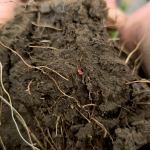
Are We Changing Soil Carbon Yet? Three Years In, the Jury’s Still Out

Farewell to Trustee Phil Schofield – A Foundational Leader of the HBFFCT
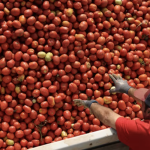

Join the conversation